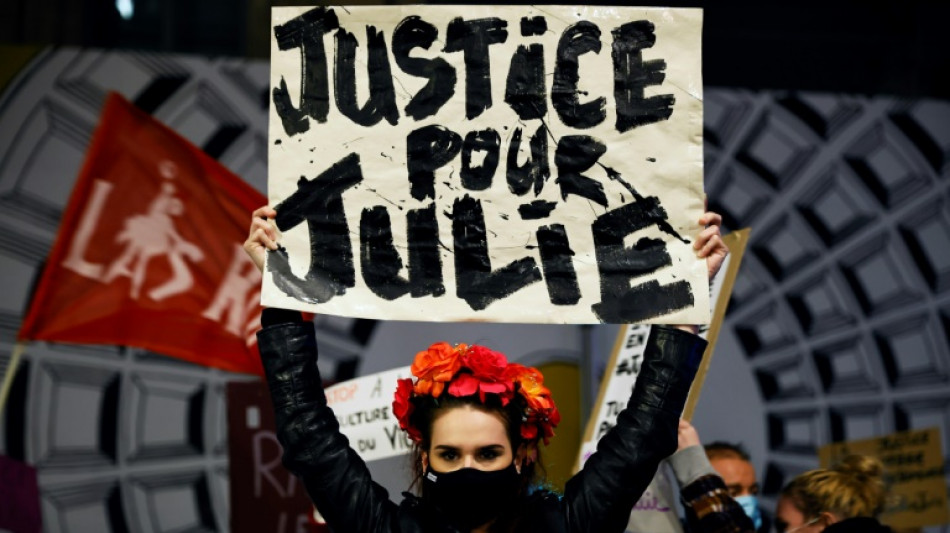

France failed to protect rights of teen rape victims: Europe court
The European rights court condemned France on Thursday for failing to protect the rights of three teenagers who reported rape, including one who accused 14 firemen of abuse.
The European Court of Human Right's decision comes after France has been rocked by a series of high-profile rape cases and as its parliament considers a bill to include lack of consent in the definition of rape.
France had "failed to protect the applicants, who had complained of acts of rape and had been aged only 13, 14 and 16 at the relevant dates, in an adequate manner", the court said.
French courts had also not "taken sufficient account, in evaluating whether the applicants had been capable of understanding and of giving consent, of the particularly vulnerable situations in which they had found themselves", the ECHR added.
In the first case, a girl born in 1995 and known in the French press as "Julie" accused several firefighters of raping her when she was younger than 15.
She was under heavy medication as she suffered from anxiety attacks, and between 2008 and 2010 firefighters on 130 occasions intervened at her home outside Paris after they were called in to help.
In 2010, she and her mother accused one fireman of rape the previous year, once in the presence of two colleagues.
She accused 14 firefighters in total of rape, but almost all of them claimed she had consented to sexual relations.
In 2019, a judge lessened the charges to sexual assault occurring without violence, threat or coercion -- key elements that define rape under French law, sparking outrage from feminists.
-'Wake-up call'-
Following a long legal battle, after she turned to the ECHR, a French court in November last year handed two of the firefighters suspended sentences of four years and 15 months.
French law changed in 2021 so that a child younger than 15 cannot legally give their consent to an adult.
But as the alleged rapes occurred before then, the fire fighters were judged under the old law.
The victim is now largely disabled after several suicide attempts.
The ECHR also condemned France for "secondary victimisation and discriminatory treatment" in Julie's case.
It reported that at least twice French authorities had failed in their duty to protect her dignity, "by permitting the use of moralising and guilt-inducing statements, which propagated gender stereotypes".
Julie's lawyer hailed the decision, calling the ruling a "wake-up call for France".
"The European Court of Human Rights says that French courts cannot behave in this way towards victims of sexual assault and sexual abuse, especially when they are minors," attorney Emmanuel Daoud told AFP.
Daoud said his client was a minor and vulnerable at the time of the investigation.
But during hearings, "Julie was treated like the accused and asked why she had not physically resisted," he said.
For Julie's parents, the ruling "washes away the humiliation and torment" inflicted on them by the police and judicial institutions, Daoud added.
A second victim accused two men aged 21 and 29 of raping her when she was 14 and a police report noted she was "clearly intoxicated".
The defendants had been acquitted at the time of the application to the ECHR.
The third applicant reported that an 18-year-old raped her at her home when she was 16, but the proceedings were dropped for lack of sufficient evidence.
In all three cases, the ECHR found "the French state had failed to fulfil its duty to apply, in practice, a criminal-law system capable of punishing non-consensual sexual acts".
- Consent-based rape law? -
The ECHR's ruling comes after several high-profile sexual assault cases in France sparked a widespread discussion about consent.
In December, a French court found 72-year-old Dominique Pelicot guilty of drugging his then wife Gisele for almost a decade so strangers he recruited online could rape her in her own bed while unconscious.
France is now considering a bill to include a clear reference to lack of consent in the definition of rape.
Advocates say this will enable the law to better hold perpetrators accountable but opponents say they fear the change will lead investigators to focus excessively on the victim's behaviour.
Consent-based rape laws already exist in several European countries including Germany, the Netherlands, Spain and Sweden.
E.Carlier--JdB



